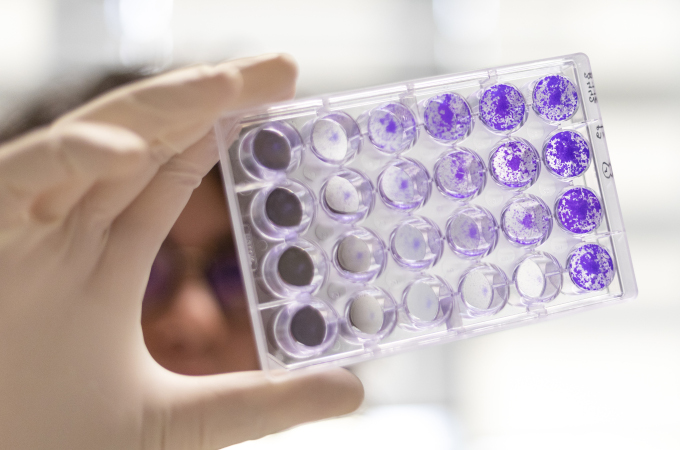Research

Oncogenic reprogramming and molecular mechanisms of cancer heterogeneity
We are modelling the massive heterogeneity of human cancer at a cell, tissue and organismal level. We combine our state-of-the-art GEMM models – particularly dual and triple recombinase systems – with an in-depth analysis of the molecular processes of cancer cells and their signaling state. This allow for a detailed spatio-temporal dissection of gene function in vivo and enables us to test the predictions, generated in our reductionist in vitro experiments, in relevant in vivo models.
Complementary, based on our findings from the biological experiments, we are developing theoretical models that allow us ultimately to predict the signaling state of a cancer cell, its specific vulnerabilities and microenvironmental interactions.
More recently, our lab is exploring the impact of genetic and epigenetic alterations on tumor phenotypes and evolutionary routes of tumor development. We use large scale genetic perturbations to dissect tumor dependencies and synthetic lethal interactions. This allows us to identify specific vulnerabilities for cancer therapy and investigate the mechanisms that make a tumor resistant to therapy.
In addition to these studies, we are dissecting the connections between oncogenic drivers and tumor suppressors by genetic engineering of barcoded mosaic tumors; this allows us to decipher clonal dynamics and the impact of heterogeneous cell populations on tumor progression and metastatic dissemination, as well as on the host stromal and immune responses.
Deciphering and targeting the tumor microenvironment (TME) in cancer
The tumor microenvironment consists of a fascinating diversity of cell types, such as infiltrating immune cell subsets and activated fibroblasts, and has a unique composition in different cancer entities. These cell types can interact with tumor cells thereby promoting their growth, aggressiveness and metastatic dissemination.
Our lab is particularly interested in how the genetic make-up of the tumor leads to distinct microenvironments and immune cell infiltrates and how this knowledge can be exploited to target the TME therapeutically to increase immune responses, block paracrine pro-tumorigenic signaling circuits and increase drug delivery.
We are also interested in how the tumor microenvironment is modulated by chemotherapy and how it can mediate drug resistance. Using single cell RNA sequencing and various advanced tumor profiling techniques, such as histocytometry and multiparameter FACS, as well as bioinformatics approaches, we systematically characterize the TME of various cancer subtypes and their response to therapy. This allows us to dissect and understand cell-cell communication and paracrine signaling, immunosuppression and therapeutic resistance.
For example, we integrate genomic and epigenomic analyses, single cell RNA sequencing and proteomic profiling to understand the connectivity networks and regulatory nodes between genetic defects in the cancer cells, and the recruitment of stromal fibroblasts and innate and adaptive immune cells. Thereby, we are exploring the complex communication between cancer cells and their neighbors and try to understand how they suppress the immune system to escape immune attack, or prevent chemotherapy from working. We hope that such integrated approaches will yield exciting new insights into cancer biology, which are essential for a holistic and mechanistic understanding of cancer phenotypes, ultimately leading to the identification of novel vulnerabilities and new avenues for drug development and cancer therapy.
Resistance to therapy
Primary and secondary therapeutic resistance are major clinical problems that limit our therapeutic options, shorten survival and impair the quality of life of cancer patients. By studying genetic alterations and trajectories of tumor evolution, we are investigating why cancer cells do not respond to therapy and how they become resistant over time.
For example, we identified preexisting clones arising from cancers cells with primary resistance to therapeutic interventions. Comparing resistant and sensitive clones side by side allowed us to understand resistance mechanistically and develop novel strategies to overcome it.
In addition, we are employing forward genetic screens as well as reverse genetic approaches, such as CRISPR/Cas9 and transposon-based mutagenesis screens, to systematically identify genetic networks and pathways mediating the resistance phenotype on a genome wide scale. This new knowledge will help us to design rational combination therapies to tackle primary as well as secondary resistance.
Metastasis
The vast majority of cancer-associated deaths are caused by the metastatic disease rather than the primary tumors. Metastasis is thought to proceed through a sequence of events that include invasion of the surrounding tissues, followed by intravasation into the blood circulation, where the disseminated tumor cells are transported to distal sites, where they can colonize and form metastases. A cancer cell is assumed to require a certain degree of plasticity to be able to undergo this sequential process of invasion and metastasis. The molecular bases and dynamics of these processes are not well understood, which hinders our ability to clinically interfere to prevent metastatic spread in cancer patients.
One important focus of our lab is to understand how the molecular and genetic makeup of the primary tumor, as well as the new environment at the seeding site, affect this process. We are actively investigating the gene expression programs of disseminated tumor cells and how they are regulated to promote metastasis using advanced techniques such as single cell Omics in combination with functional validation.

